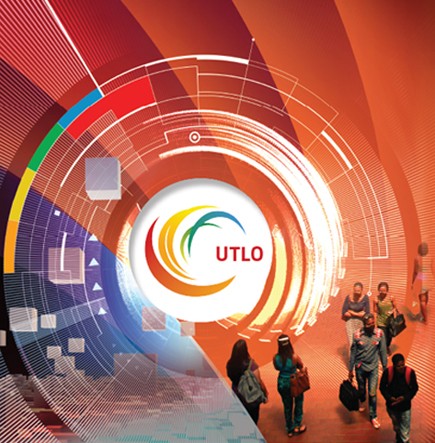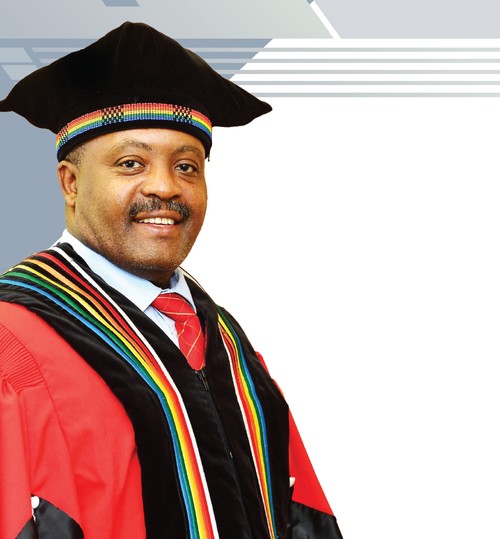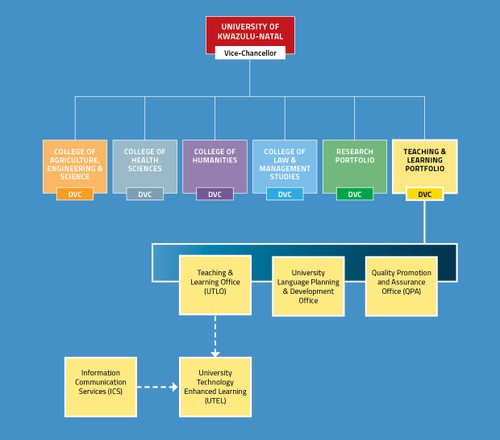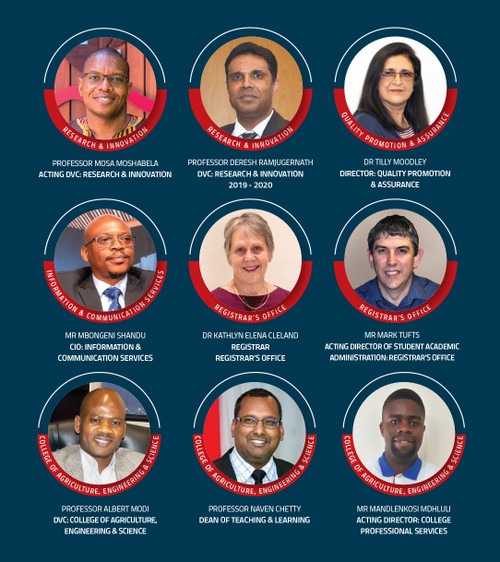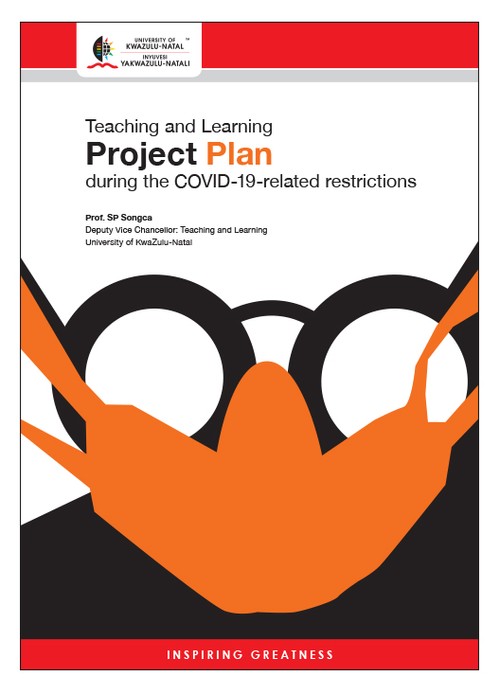The 7th Academic Monitoring and Support Colloquium at UKZN was held on 20 November 2019 at the Howard College Campus under the auspices of the College of Agriculture, Engineering and Science (CAES). Since 2013, this annual Colloquium has provided a platform for various stakeholders in teaching and learning to discuss issues pertaining to Academic Monitoring and Support (AMS) and share good practices and challenges. Over the years, it has also led to interventions in various Colleges, which have helped improve students’ overall learning experience.
Numerous changes have occurred in the South African higher education sector since the College first hosted the Colloquium in 2015. The focus of the 2019 Colloquium gave participants an opportunity to deliberate on curriculum transformation initiatives in the context of the fourth industrial revolution (4IR) in general and AMS in particular.
Student unrest across the country has sparked new debates around curriculum transformation and placed this issue firmly on the national agenda. Higher education institutions have been called upon to examine transformation of curriculum beyond numbers and physical access, but also to consider epistemological and ontological questions related to the curriculum and pedagogy. Thus, issues of content, content delivery and context have been brought to the fore. In line with these developments, several initiatives and changes have been introduced to the core curriculum of many UKZN programmes. Initiatives such as e-learning, the use of smart phones in contact sessions, the introduction of bilingual tutorials and isiZulu as a degree requirement are examples of the ways in which different Schools are embracing transformation in their core curriculum. Curriculum transformation initiatives can be much more effective when they are reinforced by support programmes.
Thus, this colloquium focused on the extent to which AMS programmes are aligned to curriculum transformation; the effectiveness of the curriculum transformation initiatives in these programmes and how curriculum transformation can enhance AMS programmes.
The papers presented by academic, support, and AMS staff, and students focussed on the following:
- Quantitative and qualitative evaluations of AMS programmes that involved curriculum transformation initiatives.
- Cohort analysis on the impact of AMS on student outcomes (retention, drop out, graduation).
- Student perceptions of current AMS programmes.
- College/School evaluations of AMS programme initiatives and the possibility of aligning them to curriculum transformation.
Attendance
The AMS Colloquium 2019 was attended by a wide array of participants from different universities and institutions in South Africa; the 140 participants were based at the University of Stellenbosch, Durban University of Technology, Rural Education Access Programme, Siyakhana and UKZN.
Among the attendees were the DVCs: CAES and CLMS, DVC: Teaching & Learning, Deans of Teaching & Learning from three Colleges, Deans and Heads of Schools, Director of the UTLO, senior and junior academic staff, Managers of College Academic Services, Academic Development Officers (ADOs), various AMS staff, counselling staff, and postgraduate and undergraduate students.

Figure 14. Designation of participants in the 7th UKZN AMS Colloquium
Welcome Address
Professor Naven Chetty, Dean of Teaching & Learning, CAES
Professor Chetty welcomed all participants to the Colloquium. He emphasised the importance of AMS in universities, especially in the context of massification of higher education that has resulted in serious challenges that impact the quality of graduates, throughput rates and overall time taken to complete degrees. This speaks to the need for AMS to be more than simply academic support and calls for streamlined, student-centred, palliative and inclusionary AMS. Professor Chetty also reiterated the need for a more holistic and consistent AMS programme. The Colloquium enables scholarly partnerships at all levels to enhance the student experience and improve the quality of current AMS practices. He emphasised that visionary AMS strategies not only enhance the student experience but also enrich UKZN’s teaching and learning strategy while maintaining the Institution’s high academic standards.
Presidential Address
Professor Albert Modi, DVC: CAES
 Professor Albert Modi, DVC: Agriculture, Engineering and Science delivering the Presidential Address.
Professor Albert Modi, DVC: Agriculture, Engineering and Science delivering the Presidential Address.
Professor Modi highlighted the challenges faced by the school education system in South Africa and noted that science, technology, innovation and development strategies should be driven from a South African perspective. He emphasised that the higher education sector aims to mould and produce graduates that can fulfil global needs. AMS programmes that are aligned with rigorous curriculum transformation assist in fulfilling this purpose. AMS has improved our ability to identify student performance in the early days of their academic journey and consistently improve it as they progress through their undergraduate degree.
Keynote Address
Professor Eli M Bitzer
TOPIC: Curriculum renewal in Higher Education in an era of the fourth industrial revolution, with some reference to Academic Monitoring and Support
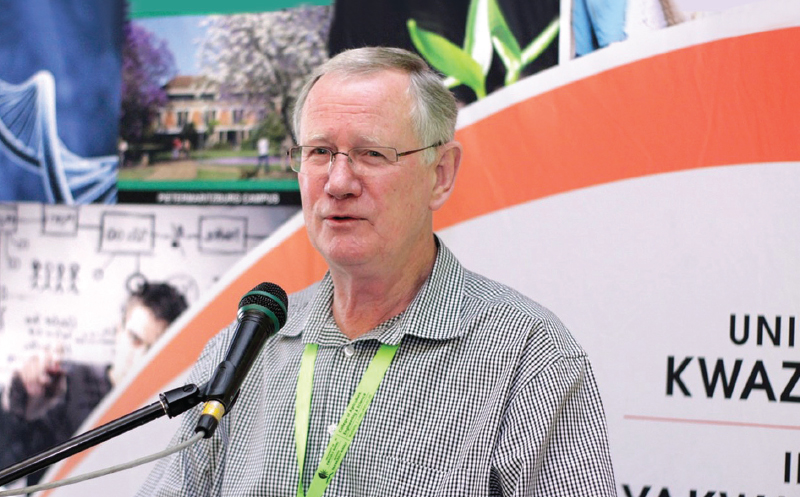 Professor Eli Bitzer, University of Stellenbosch, delivering the Keynote Address.
Professor Eli Bitzer, University of Stellenbosch, delivering the Keynote Address.
Professor Bitzer has worked in the field of higher education for more than 40 years, has published widely and is the editor or co-editor of six scholarly books. He began by offering perspectives on programme and curriculum renewal in higher education, including knowledge and skills gaps, often caused by outdated or traditional curricula, hampering attempts to be more relevant to social and economic change.
He noted that in the following three years, an estimated 120 million workers in the world’s 12 largest economies would need to be retrained or reskilled as a result of artificial intelligence and automation. Another perspective involved curriculum renewal in South African higher education, including AMS curricula. The first part of the address ended with a few questions on the implications of a possible disjuncture between curricula and societal change and examples of current programme renewal efforts at one university.
The second part of Prof Bitzer’s address linked the 4IR to the three previous industrial revolutions and examined how higher education curricula responded to them. Some emerging realities from the 4IR were highlighted as well as how they might affect future employment possibilities. Prof Bitzer identified a set of ‘tipping points’ when 4IR technologies will be sufficiently widespread to create extensive societal and other change. These include a proliferation of 4IR technologies to levels where they impact significantly on peoples’ lives and require shifts in education and employment. The third section highlighted some higher education responses to the 4IR, including the role of the social and human sciences. Prof Bitzer provided suggestions on how AMS programmes and curricula might become more relevant within the era of the 4IR and suggested that knowledge, skills and behaviour relating to technology might play an increasingly important role, especially in preparing students for future curricula and work.
Professor Bitzer ended with two questions for group discussion:
- Is the notion of the 4IR relevant (or perhaps too distant, or its implications perhaps too tentative or uncertain) for South Africa to respond appropriately through AMS at UKZN?
- Based on the response to (a), what should AMS at UKZN stop doing, continue doing or do differently to adequately prepare students for study success (especially those students entering programmes that might respond more rapidly to the 4IR)?
Workshop
Ms Lucinda Johns
TOPIC: The Need for Emotional Intelligence in Higher Education Institution
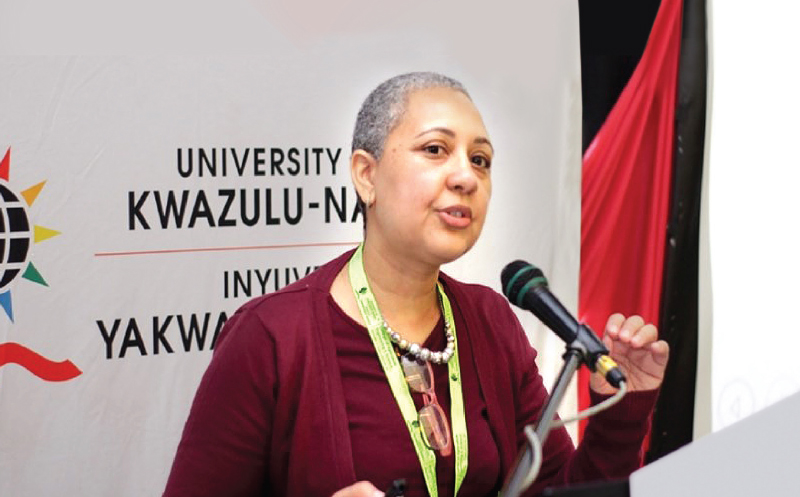 Ms Lucinda Johns, Psychologist, conducting the workshop on Emotional Intelligence during the 2019 AMS Colloquium.
Ms Lucinda Johns, Psychologist, conducting the workshop on Emotional Intelligence during the 2019 AMS Colloquium.
Ms Lucinda Jones, former lecturer in Psychology at UKZN, is a counselling psychologist from Durban who offers therapy to individuals as well as couples and families. She completed her MA in Counselling Psychology at UKZN. Her areas of interest include anxiety and depression; relationship difficulties; dealing with traumatic life experiences; death and dying/preparing for end of life; coping with grief and bereavement; dealing with adjustment to physical disabilities and illness; and work and career adjustment issues.
Ms Jones noted that, failure to manage unpleasant emotions often prevents a person from achieving success in leadership, relationships, or health. Emotional information is useful in guiding thinking and behavioural responses. The ability to be aware of one’s emotions, to express them appropriately, and to manage interpersonal relationships is a valuable skill, particularly within multicultural environments. The workshop provided a comprehensive understanding of emotional intelligence and highlighted core competencies. The areas for discussion included self-awareness; self-regulation; empathy; motivation; self-confidence; resilience; and interpersonal and social skills. In general, it promoted self-reflection and self-awareness to identify personal strengths and capabilities, recognise interpersonal challenges and to be cognisant of sociocultural influences on emotional expression.
Panel Discussion 1
Chair: Professor Ruth Hoskins
TOPIC: Review of the draft UKZN AMS policy (2020): strengths and weaknesses
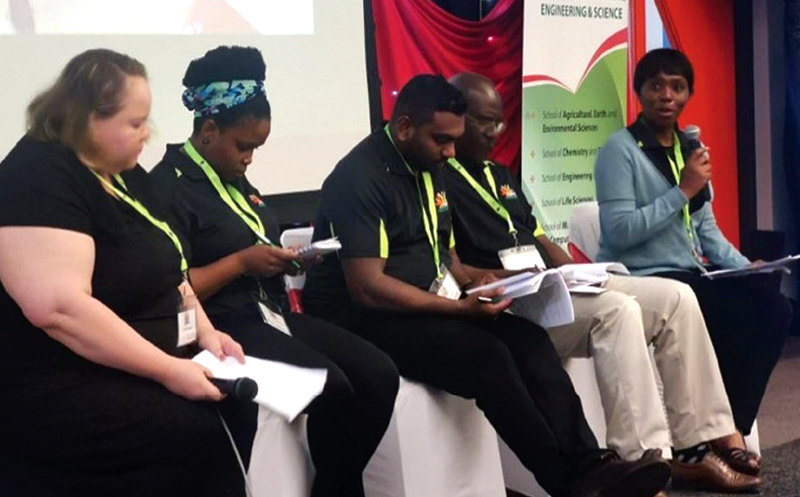 Panel Discussion 1 members (from left): Professor Ruth Hoskins, Mrs Nozipho Hlalukane, Mr Ashwin Maniwal, Mr Godfrey Marumure and Dr Annah Bengesai.
Panel Discussion 1 members (from left): Professor Ruth Hoskins, Mrs Nozipho Hlalukane, Mr Ashwin Maniwal, Mr Godfrey Marumure and Dr Annah Bengesai.
Participants were grouped according to their Colleges, and each was allowed 30 minutes to submit points after discussion on the new AMS policy, which was emailed to all participants a week before the Colloquium. Below is a summary of the points presented:
Professor Naven Chetty, Dean: Teaching & Learning, CAES, gave a detailed background of the AMS Policy and the need to revise it. He also noted that the exclusion part had been removed from the new Policy. Participants from all Colleges commented that they would have preferred to look at this draft policy in conjunction with the new exclusion Policy as well as the standard operating procedures for implementation.
The proposed AMS Policy’s shift from a reactive to a proactive approach with respect to student academic performance was welcomed; however, it was felt that much emphasis had been placed on underperforming students, with less or no consideration or support for overachieving students and those in good academic standing. A major concern across Colleges was that the Policy lacked a clear implementation plan and there was no indication how the University planned to deal with the limited resources and infrastructure available to those who would drive it on the ground. In summary, the draft AMS Policy document was praised for being proactive and not reactive. The main problem was that it lacked a clear implementation strategy, which could result in problems in the future, including a lack of available resources and trained professionals. Technological advances such as Auto Scholar and biometrics were still in the testing phase and would serve as poor defences for the policy until they were proven to work on a large scale. The policy should also hold students accountable for attending student support activities. It required further refinement and more careful thought, preferably on more of a pragmatic level and less on a philosophical one.
Panel Discussion 2
Facilitator: Mr Ashwin Manival
TOPIC: Alignment of Academic Monitoring and Support to curriculum transformation in South African tertiary institutions
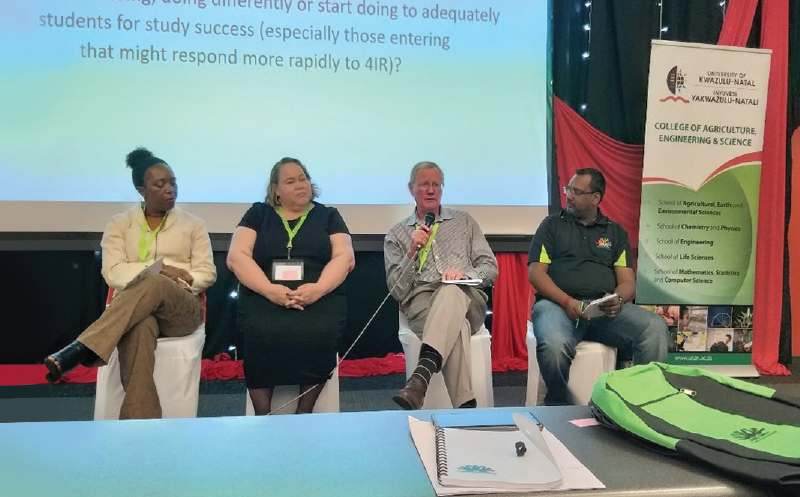 Panel Discussion 2 members (from left): Professor Sinegugu Duma (Dean, Teaching & Learning, CHS), Professor Ruth Hoskins (Dean, Teaching & Learning, CHUM), Professor Eli Bitzer (University of Stellenbosch), and Professor Naven Chetty (Dean, Teaching & Learning, CAES).
Panel Discussion 2 members (from left): Professor Sinegugu Duma (Dean, Teaching & Learning, CHS), Professor Ruth Hoskins (Dean, Teaching & Learning, CHUM), Professor Eli Bitzer (University of Stellenbosch), and Professor Naven Chetty (Dean, Teaching & Learning, CAES).
The final session of the day gave all participants, including the panel members, the opportunity to interact, deliberate and air their opinions on the 4IR, the need for curriculum transformation in AMS programmes and the current scenario of students in South African higher education institutions. While various issues were discussed, this session centred on two questions:
- Is the notion of the 4IR relevant (or perhaps too distant, or its implications perhaps too tentative or uncertain) for South Africa to respond appropriately through AMS at UKZN?
- What should AMS at UKZN stop doing, continue doing or do differently to adequately prepare students for study success (especially those students entering programmes that might respond more rapidly to the 4IR)?
It was noted that with changing times and the advancement of new technologies, mainstream teaching and learning as well as AMS programmes at UKZN must adapt to the 4IR. Universities all over the world are changing with respect to digitalisation of teaching and learning and the University has no choice but to follow suit. Market demands and needs require UKZN to embrace the 4IR and if not, we will be left behind as the world will soon move on to the 5IR. There is also an urgent need for academics to change and adapt to at least the basic elements of the 4IR since the students that they teach are digital natives. For example, for students with disabilities, the 4IR and using technology in higher education may be very beneficial but training educators in pedagogy and imparting knowledge will surely help students. Universities cannot be spectators of various industrial revolutions but need to move with the times. The under preparedness of students especially from disadvantaged backgrounds in the context of 4IR was also discussed.
Panellists reiterated that reorientation of students as well as academics is very important if we aim to keep up with the latest developments in technology. The social nature of higher education must not be lost and must be taken into account. There is also a need to mainstream AMS so that students benefit. AMS should be taken very seriously and it should be a core element in improving student throughput and completion in minimum time. Not only the curriculum needs transformation; university staff need to be responsive and transformed to help students. However, cognisance must be taken of students’ learning styles and technology overload should be avoided.
Winners of Best Paper Presentation Awards
The chair of each paper presentation session together with a judge who is an expert in AMS evaluated the presenters on their subject content, presentation skills and visual aids and the final weighted score was used to award prizes for each section. The winners of each session were:
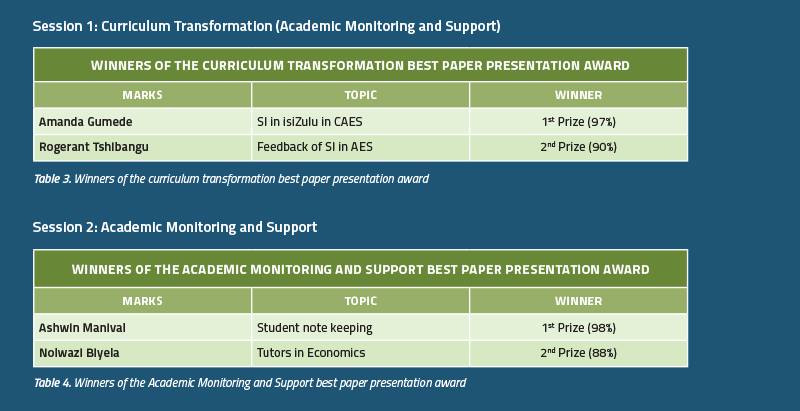
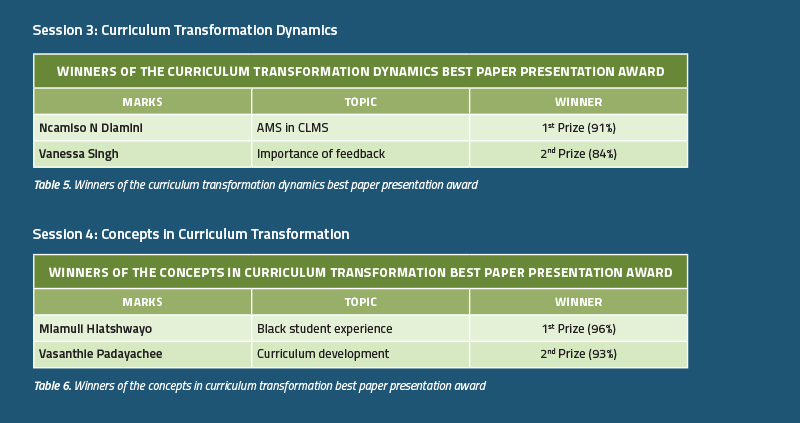
Feedback from the Participants
Many participants shared their experiences regarding the theme, quality of the keynote presentation and workshop, quality of papers presented and overall organising of the colloquium. The feedback was positive and participants commented on the organisers’ attention to the minutest detail. The theme of the Colloquium was described as very relevant and it was noted that the various sessions were not only true to the focus but also helped in deliberations on pertinent issues at UKZN and other higher education institutions in South Africa.
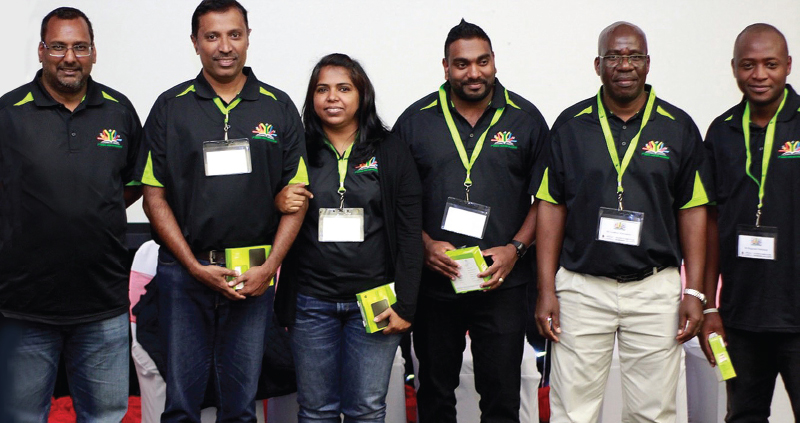 Members of the organising committee of the colloquium (from left): Professor Naven Chetty, Dr Boby Varghese, Dr Dalia Varghese,Mr Ashwin Manival, Mr Godfrey Marumure and Mr Rogerant Tshibangu.
Members of the organising committee of the colloquium (from left): Professor Naven Chetty, Dr Boby Varghese, Dr Dalia Varghese,Mr Ashwin Manival, Mr Godfrey Marumure and Mr Rogerant Tshibangu.
Critical Reflections: AMS Colloquium 2019
The AMS Colloquium 2019 was a rich and inspiring experience for all participants as it brought the experts in the field of higher education, academic, administrative, professional and support staff, and undergraduate and postgraduate students together to deliberate on best practices, the current strengths and weaknesses of AMS and the way forward to improve its efficacy.
In general, the participants agreed that higher education must embrace the 4IR. Any curriculum transformation in this regard in mainstream and AMS programmes must be student-centred since students have to be ready for the market place. It was also noted that both academics and students should be reoriented to the 4IR without which any transformation in the curriculum and pedagogy will not be successful. Nonetheless, transformation efforts such as AMS programmes in isiZulu, bilingual tutorials in various Colleges, digital teaching and learning practices to enhance student engagement, and constructive changes in the current AMS policy at UKZN among others, are a step in the right direction. Finally, the emotional well-being of students and staff alike is critical.
The Colloquium also provided a platform to share and learn from exemplary practices across Colleges. Each session and discussion was set to enhance teaching and learning and AMS practices, not only to increase success and graduation rates, but also to produce graduates who are ready for the fourth and fifth industrial revolutions.

